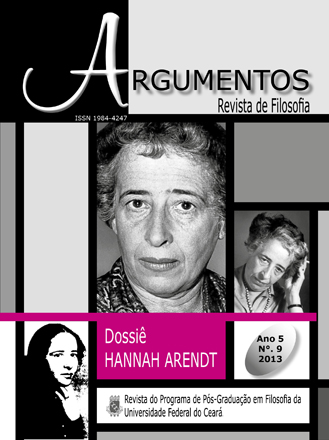Arendt and Kant: banality of evil and radical evil
Keywords:
Radical evil. Banality of evil. Totalitarianism.Abstract
In The Origins of Totalitarianism Hannah Arendt employs the term radical evil, understood as absolute evil, to refer to the production of superfluity in concentration camps. In Eichmann in Jerusalem she employs the term banality of evil to refer to the conduct of individuals like Adolf K. Eichmann, who in their superficiality have witnessed an unprecedented gap between the wrongdoer and the stature of their transgressions. I intend to examine in this text the use of these expressions by Arendt, particularly starting from his references to Kant’s reflection on radical evil.Downloads
Published
Issue
Section
License
Argumentos magazine is licensed under an International Creative Commons Attribution License.
The Magazine uses CC BY inclusion
1) The authors retain the copyright granted to the magazine or the right to initial publication, with the work regularly licensed under the Creative Commons Attribution, which allows the sharing of the work with acknowledgment of authorship and initial publication in this magazine.
2) The authors are authorized to contract additional applicable contracts, for non-exclusive distribution of the version of the work published in this journal (for example, publication in the institutional repository or as a chapter of the book), recognition of authorship and initial publication in this journal.
3) Authors are authorized and encourage to publish and distribute their work online (for example, in institutional repositories or on their personal pages) at any time before or during the editorial process, as they can generate productive changes, as well as increase the impact and reference of published work.




.jpg)










._._3.png)
1.jpg)
._._._.png)
